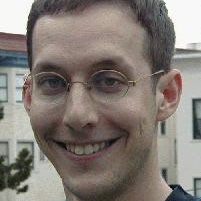Faculty Who Failed Series: David Bindel

David Bindel in graduate school
April 15, 2024
Graduate school is a time for students to push themselves, try new things, and explore. It’s also a time when students are likely to experience what feels like failure. These small or large challenges along the way to your degree are to be expected, and most faculty members experienced such stumbles themselves in graduate school.
To share stories of successful people who have overcome the setbacks that come with pursuing a graduate degree, we’re interviewing faculty members about how they “failed” in their academic careers. The Faculty Who Failed series highlights how resilience can carry you through the tough times in your degree program and come out of the experience stronger and better prepared for future challenges.
Read about Professor of Computer Science, Director of the Simons Collaboration on Hidden Symmetries and Fusion Energy, and Director of the Cornell Center for Applied Mathematics David Bindel‘s experiences.
Can you describe a time you felt like you failed in graduate school? This could be a time when an experiment didn’t work out, you considered leaving (or did leave) your program, etc.
As a student in the Berkeley computer science Ph.D. program, I had to take a preliminary exam in my area (numerical methods). The format varied by area, but for me it was an oral examination by two professors in the area. Though I thought I was well-prepared at the outset, I started to struggle in the first few minutes. The exam lasted for three hours, and I was completely incoherent by the end. It was a disappointment for both me and the professors; at the end of the exam, one of them left with the parting words that “to pass an exam like this, you don’t have to know everything, but you do need to know something. Today you haven’t shown you know anything!” I was crushed. I considered leaving the program. Fortunately, I decided not to make any decisions while I was feeling so distraught.
How did you bounce back from your perceived failure, or what got you through to the other side?
My advisor (who was one of the examiners) wrote an email to me afterward and was encouraging. He explained that from his perspective, the problem was not that I didn’t know how to address the questions they chose; it was that I hadn’t fully internalized the material, so that I needed to think a bit to come up with an answer, and I had trouble doing that under the pressure of an exam. “You wanted to derive the answer,” he said, “and we wanted you to just know the answer, and only explain the details if we asked.” We worked together to come up with a syllabus of material that I should know by heart, well enough to answer questions about it quickly even while I was feeling under pressure. I spent a lot of time studying, and passed when I re-took the exam the following semester. It took three hours the second time, too, but we were all enjoying the process a lot more!
What lessons did you learn from this experience?
Other than learning a lot about numerical methods, I learned three big things from this experience:
- My advisor was right: I knew the material well enough to get good grades on the written exams in my classes, but not well enough to “just know the answer.” Figuring out the difference between these two types of knowing had a huge impact on how I treated graduate school (and the rest of my research career).
- When someone comments on your poor performance, they might be commenting just on one poor performance and not on what they think of your overall ability to perform well in the future. I heard “today you haven’t shown you know anything,” but it might have been more accurate to hear “today you haven’t shown you know anything.” That professor became one of my valued mentors and advocates, and has given every sign that he is happy with how I turned out – even if he (accurately) panned that first prelim attempt.
- It’s important to give honest feedback to students, but it’s also important to work hard to make sure they understand the feedback beyond a first emotional reaction. Immediately after the exam, my only reaction was the emotional realization that I had failed. My advisor’s email made all the difference in the world not only because he helped me understand how I had failed so that I could succeed the next time, but also because of his kindness and encouragement.
How did you use this experience to become better at what you do?
At the surface level, studying for my second attempt at the prelim made me a lot better at numerical analysis! It was also good preparation for many aspects of research where a well-practiced facility with the material – “just knowing” the basics – meant that I could focus on the really new parts when understanding papers and talks or engaging in research conversations with peers. It was also good preparation for teaching, particularly during the semesters when we had new babies at home and the concept of “being able to do it in your sleep” took on new meaning!
What advice do you have for current graduate students who might be struggling or in a comparable situation?
To fail is not the same as being a failure. You are not just your failures, whether real or perceived, and what matters after a failure is what you learn and what you do next. When you feel like “I’m a failure” rather than acknowledging “I failed in this situation,” it is probably a good idea to do step away for a bit and let your emotions die down so that you can see an opportunity to learn (and to do better next time!).

